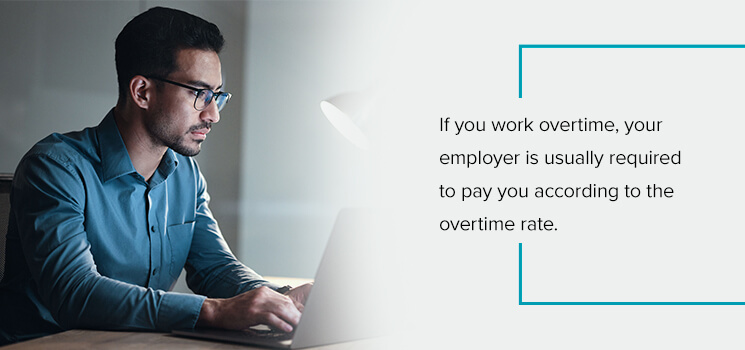Have you noticed your paycheck seems to be lower than you expected? Were the hours you worked recorded incorrectly? In these situations, you may have a wage and hour claim. However, many employees hesitate to pursue legal action for fear of retaliation or termination from work.
If you are dealing with the stress of unpaid wages, you are not alone. The U.S. Department of Labor Wage and Hour Division (WHD) has recovered more than $274 million in unpaid wages in 2023 for workers across the nation. Each employee received an average of $1,297 in back wages following the WHD’s investigations.
Regardless of whether your employer owes you regular pay or overtime pay, you may be able to recover your unpaid wages, interest on this amount and penalties your employer is required by law to pay. At Weisberg Cummings, P.C., we can help you determine whether you have a viable claim and what your Pennsylvania wage and hour case may be worth.
Issues Involving Minimum Wage
In most cases, your employer must pay you at least the federal, state or local minimum wage, whichever is higher. However, there are some employees who do not need to be paid the federal minimum wage.
Minimum Wage Exemptions
According to federal law, the following workers do not need to be paid the minimum wage:
- Outside salespeople
- Newspaper deliverers
- Workers on small farms
- Independent contractors
- Students, learners and apprentices
- Employees of local newspapers with limited circulation
- Switchboard operators who work for certain, smaller phone companies
- Workers for recreational businesses or seasonal amusement businesses
If you are a tipped employee in Pennsylvania, you are also paid differently — though you must still make at least the state minimum wage.
Pennsylvania Minimum Wage
Both the federal minimum wage and the Pennsylvania minimum wage are set at $7.25 per hour. If you and your employer have agreed to a rate greater than the minimum wage, this should be included in your offer letter or employment contract, and your employer must pay you this rate.
Employers of tipped employees in Pennsylvania can claim a tip credit, which means they can pay you the cash minimum wage of $2.83. This is paid with the assumption that you will earn enough in tips to make the state minimum wage of $7.25. If you do not earn enough in tips to reach the $7.25 hourly wage, your employer will pay you the difference.
What Happens if Your Employer Does Not Pay You?
If your employer does not pay you the minimum wage or your agreed-upon wage for every hour you work, you may have a legal claim against your employer for damages. Employers cannot withhold payment even if you are fired or quit.
To recover your unpaid wages, you can either file a claim with the Pennsylvania Department of Labor and Industry or bring a lawsuit in court with the assistance of an employment lawyer. Reach out to a wage or overtime lawyer in the following circumstances:
- Your employer fails to pay you what you are owed for every hour you work.
- Your employer withholds pay for work you are required to perform from home.
- Your employer pays you your regular rate when you are owed overtime pay.
- Your employer refuses to pay you for mandated, on-the-job training.
When you are not being paid what you are owed, an experienced attorney can help you reach an unpaid wages settlement.
Issues Involving Overtime
Many wage and hour claims are associated with overtime. Your employer is required to pay you your regular pay rate for every non-overtime hour you work. But if you work overtime, your employer is usually required to pay you according to the overtime rate.
What Is Overtime Pay?
In most cases, if you work overtime, you will be paid time and a half or 150% of your usual rate of pay. If this is how your employer pays overtime hours, you can calculate your overtime pay by multiplying your regular rate by 1.5. For example, if you are paid $20 an hour, your overtime pay would be $30 per hour.
Who Is Not Eligible for Overtime?
Not all workers are eligible for overtime. For example, salaried employees whose job duties include administrative, executive or professional tasks and earn more than the salary threshold may not be eligible for overtime.
If you are eligible for overtime and your employer does not pay you the overtime rate for hours you worked over the standard 40 hours, you may have a wage and hour claim that you can pursue. At Weisberg Cummings, P.C., we have experience with reaching unpaid overtime settlements for working Pennsylvanians who are owed overtime back pay.
Off-the-Clock Work
Some employers require their employees to work before their shifts start or after finishing their shifts. An example is answering work-related emails or calls when you are off duty. If your employer requires this off-clock work, they should pay you for it. If you are not paid, you may claim for these unpaid hours as wages owed.
Illegal Deductions
Your employer should not deduct money from your paycheck if the deduction would drop you below minimum wage. If your employer deducts money from your paycheck as fees for cleaning your uniforms or because there was a shortage in the cash register, you may have a claim.
Recovering Damages From a Wage and Hour Claim
The amount of money you are able to recover from a wage and hour claim against your employer is known as damages. If the lawsuit against your employer is successful, you may win damages in a few categories, including the following:
- Unpaid wages: If your lawsuit or claim is successful, you may be awarded the wage amount your employer owes you. For example, if you should have been paid the overtime rate for working more than 40 hours but were paid your regular rate, your employer must pay the difference between what you were paid and what you should have been paid for overtime.
- Interest on unpaid wages: You may also be able to recover an award of interest based on your unpaid wages. In some cases, you may be paid liquidated damages rather than interest. Liquidated damages are amounts determined by federal wage laws. If it is determined that your employer acted willfully, or not in good faith, you may be paid double your unpaid wage amount in liquidated damages.
- Attorney’s fees: If you win your Pennsylvania wage and hour case, your employer must pay your attorney’s fees and your associated costs of pursuing the case.
- Penalties: Your employer may also be required to pay a penalty on top of the unpaid wages, interest and attorney’s fees.
Typical Settlement Amounts
Estimating the average settlement for unpaid wages is difficult because of the diverse factors at play. States have different averages due to their different applicable minimum wage rates. In addition, small individual claims typically have lower compensation or damages than large class and collective actions. Whereas settlements for small claims can range between $1,000 and $10,000, settlements for class actions can run into millions of dollars as collective payments for all employees seeking damages.
Factors That Determine How Much Your Case Is Worth
If you suspect you have a claim and are trying to figure out the average settlement for unpaid wages in Pennsylvania, you may have difficulty finding accurate figures. California, which has the most unpaid wage claims in the country, has an average settlement of $6,000 per individual. In addition, unpaid wage class action suits in the U.S. can have settlements of up to $50,000 per worker.
Several factors determine settlement amounts for unpaid wage claims:
- Period of unpaid wages: The longer the duration of unpaid wages, the larger the settlements. Employees who have been unpaid for months or years receive larger settlements than employees claiming unpaid wages for weeks.
- Number of employees in the claim: A high number of employees means a high amount of money owed, leading to large settlement offers. A class action can motivate more employees to join the lawsuit and increase the potential settlement for each worker.
- State labor laws: Some states have more employee-protective laws than others. For example, states with high minimum wages will have higher settlements than states with low minimum wages. In addition, such states may have meal break requirements and stricter overtime requirements.
- Strength of evidence: The damages you receive also depend on the strength of your case. You will have more leverage if there is clear evidence that your employer violated wage laws. Weak evidence might lead to lower settlements. This is why it is important that you track your worked hours, have credible witnesses to testify and obtain copies of policies.
Get a Free Consultation From Weisberg Cummings, P.C.
If you are a working Pennsylvanian and believe you have a wage and hour case, you deserve experienced legal consultation and representation. At Weisberg Cummings, P.C., our employment law attorneys provide thoughtful service. We have successfully navigated numerous wage and hour lawsuit settlements, and we can personalize our services to your needs.
With more than 40 years of combined experience in Pennsylvania employment law, our lawyers can evaluate your claim and estimate how much your case may be worth. Contact us at Weisberg Cummings today for a free consultation with one of our employment attorneys.



